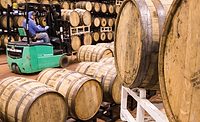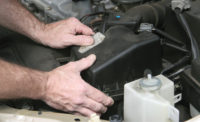Sometimes you want to take care of your own backyard. That’s essentially the reason that Boston-based Harpoon Brewery — now the 18th largest craft brewer in the country, according to the Brewers Association, operates a separate distribution business to serve its home market.
When Harpoon first opened its doors in 1986, the brewery, like many startup craft producers, self-distributed in its immediate region out of necessity. About a decade later, as the company grew, it signed with a local wholesaler to take over distribution in the Greater Boston area. However, a few years after that, it brought local distribution back in house under its wholly owned subsidiary, Harpoon Distributing Co.
“Two things were the primary drivers,” says Charlie Storey, president of Mass Bay Brewing Co., the parent company’s corporate name for the brewery and distribution company, as well as Clown Shoes Brewing, which it acquired last fall. “We felt we could improve our performance as we felt it was important for us in our home market to have that direct relationship with retailers. The opportunity to do business directly helps us understand our market and understand the trends driving it.”
Today, the company continues to distribute Harpoon brands within a 25- to 30-mile radius of the brewery, while wholesaler partners handle the rest of its 22-state distribution map.
Harpoon Distributing also has picked up a few outside brands, including Speakeasy and Barrel House Z, which it’s helping grow on its home turf.
Harpoon Distributing is managed separately from the brewer, though they share a headquarters.
“It’s managed out of the same building,” Storey notes. “There’s spatial overlap, if you will, but [the distribution company] is an independent entity. There’s no overlap between tasks on either side. Someone who works on the distribution side doesn’t do things like packaging, brewing and filtering.”
He advises that any brewer pondering self-distribute (in states that allow it) must recognize that distributing beer is a completely different business than producing it and should operate as such. “It’s not simply an extension of brewing,” he says. “It’s actually its own independent enterprise and has to be managed that way. It’s an operation that requires operational efficiencies. There are a lot of ways to get those, but if you can’t deliver on operational efficiencies, it’s probably not sustainable.”
Distribution, he continues, is not a simple process of getting a keg or a case from point A to point B, but a complex suite of services that encompasses sales, merchandising, relationship management, troubleshooting, accounting and a host of other tasks.
Having a home base smack in the middle of an urban center like Boston — Harpoon’s headquarters is in the city’s Seaport District — brings its own set of challenges.
“Boston is certainly a congested city, an old city, so the traffic patterns don’t conform to modern grids and the highways and infrastructure are old and stressed,” Storey explains. “But in the morning, in some cases, on some routes drivers are going against the traffic — outbound from the city and vice versa at the end of the day. It can, at times, be favorable for us.”
In fact, it’s the city’s dense population that provides a logistical advantage for Harpoon to manage its own distribution there. The company reaches a lot more retail customers over a much shorter geographic distance than in many other metro areas. “If it were a more geographically extensive market, without the density of population, the time between stops, the number of cases dropped per stop would probably be at a level that would make it unsustainable for us to operate,” Storey notes.
A handful of single- and double-axle box trucks, as well as a couple of cargo vans, get the job done for Harpoon Distributing Co.
Beyond operational efficiencies, there are definite sales and marketing advantages for Harpoon. Distributing one’s own products means the brewer gets close to 100 percent share of mind.
But Storey cautions that self-distribution may not be the best option for everyone. Wholesalers have become much more adept at handling and selling craft beer, much more than they were in Harpoon’s early days — a time when many small brewers just starting out couldn’t even get distributors to return their calls.
“In this day and age, large distributors have become extremely proficient at selling craft beer,” Storey says. “They’ve got knowledgeable salespeople and they’ve got all the efficiencies to sell craft beer extremely well.
“There’s not one solution that’s right or wrong,” he continues. “A brewery could self-distribute, go with a large wholesaler with a big portfolio or a smaller wholesaler with a very limited portfolio of smaller brands. Making the right decision has got a lot of variables to consider; there’s not just one right path.” BI



